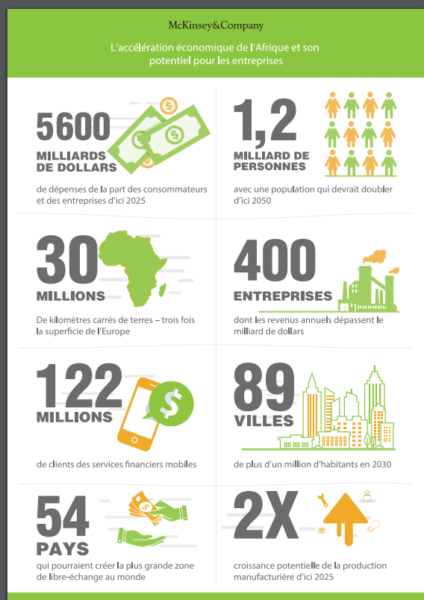Eight years after his report on “Lions in motion, the progress and potential of African economies,” McKinsey and his leading economist Acha Lake, return with a new study on “Africa’s extraordinary growth potential.”
Africa is on the path to an unprecedented acceleration of its economic growth, similar to that experienced in Asian markets. This is the main conviction of McKinsey’s new book on the African economy.
Global companies that enter these markets early with perfectly targeted strategies could, like growing African champions, benefit from double-digit revenue growth over the coming decades.
In “Africa’s Business Revolution: How to Succeed in the World’s Next Big Growth Market” (published November 20, 2018 by Harvard Business Review Press), Acha Leke, Mutsa Chironga and Georges Desvaux expose their analyzes and perspectives on the future growth of Africa.
The book’s findings include more than 3,000 McKinsey projects with clients, the firm’s research, and interviews with 40 executives from African businesses and economic institutions. . The three authors highlight the factors that enable companies to better understand the issues facing African markets and to seize opportunities to establish activities that combine profitability and sustainability.
Some basic trends indicate Africa is on the brink of exponential growth
Africa has a rapidly growing population that is rapidly urbanizing, with significant needs still largely unmet. So there is a historic opportunity, whose economic potential is $ 1600 billion, accelerate the industrialization of Africa and to meet growing domestic demand, but also to open up more to markets global exports. In addition, Africa will need to reduce its infrastructure deficit, particularly by intensifying cooperative efforts by governments and the private sector. It can also rely on its abundant agricultural resources, oil, mining and gas, while technological innovation and recent investments in these sectors open new production prospects on the continent. Finally, the rapid adoption of disruptive mobile or digital technologies should enable Africa to overcome a number of impediments to growth through the early and early dissemination of global best practices.
Acha Leke and Georges Desvaux, both Seniors Partners of McKinsey, and Mutsa Chironga, head of Nedbank, one of South Africa’s leading banking groups, say:
“By analyzing more than 400 African companies with annual sales of $ 1 billion or more, we have been able to identify the key drivers of performance for Africa’s players. The most successful companies are often African companies, even if their founders are sometimes Western, Indian or Chinese. The most profitable organizations in the long term are also those which have demonstrated a higher tolerance for risk, those who are ready to adapt their products, but also their production and distribution methods to the requirements of African consumers, and finally those who invest. and develop their activities in a long-term perspective. ”
African success stories
This book reviews several examples of African companies that have converted opportunities into sustainable added value. For example, it shows that the Nigerian conglomerate Dangote Industries has been able to modernize its industrial tool to serve the regional markets by offering a competitive alternative to import products, and to improve its margins through a competitive approach. vertical integration. Jumia, an e-commerce pioneer founded by two French CEOs with 400,000 partner companies to date has adapted sasupply chain and its distribution centers to local logistical constraints and innovated in the training of local executives. SABMiller has developed tailor-made products to better satisfy local tastes and has made massive investments accompanied by skills transfers. In Kenya, start-up M-Kopa has bet on both technological and financial innovation by offering off-grid solar energy kits financed by mobile money transfers. The book’s authors also look at large multinationals that have been successful in Africa for decades, such as Coca-Cola, GE and Total.
Four prerequisites for long-term growth
Acha Leke, Georges Desvaux and Mutsa Chironga believe it is crucial to take a long-term approach to building the foundations for successful settlement and development in Africa. In particular, they highlight four conditions for success:
- Draw a resolutely African strategy – show clear ambition, map the African markets on which to invest, determine the appropriateness of approaches to deploy activities across the continent, and create a fertile ecosystem to drive growth.
- Build innovative business models – create a real dialogue with consumers, develop products and services that meet unmet needs, create lean business models to limit the cost base and lower prices, and unlock the full potential of technology.
- Ensure business resilience – avoid short-term volatility, diversify offerings, vertically integrate the value chain upstream and downstream, understand the local context and engage with governments.
- Betting on talent – building employee skills, developing successful human capital development processes, and seizing the economic potential of women’s advancement within organizations.
“At the heart of these four imperatives is a strong societal commitment,” says Acha Leke. “We have been able to meet and work with outstanding business leaders from around the world: what struck us is that many of them are driven by an ambition that goes far beyond the limits of their own economic activities. All are well aware of the still high levels of poverty in Africa, the need for infrastructure, education or health, and the fragility of governance. Georges Desvaux adds: “Leaders in Africa are not content to address the obstacles to the development of their businesses – they are attacking the human challenges they intend to help address. They show us that participating in the social and economic development of the countries in which they operate creates value for shareholders and all stakeholders. “



